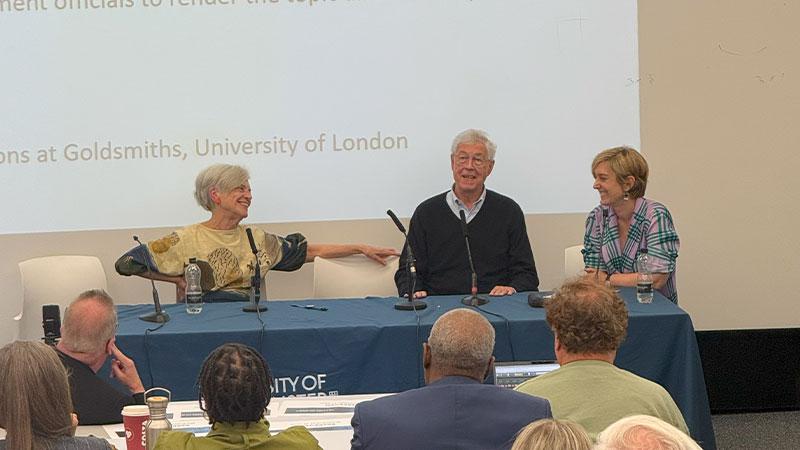The University of Westminster has marked the 50th anniversary of its pioneering Media Studies degree - the first undergraduate course of its kind in the UK. The programme began with a celebration event and concluded with a two-day conference, bringing together students, academics, alumni and global media scholars to honour a half-century of media education.

The festivities began on 21 May at the University’s Marylebone Campus with an internal celebration that traced the department’s rich history and enduring impact on the field. The day was structured around a series of engaging conversations that reflected on the School of Media and Communication’s development and looked forward to the future of media education.
Professor Peter Bonfield, Vice-Chancellor and President of the University, opened the event, setting the tone for a day that explored themes of decolonisation, media practice, political economy and the experiences of today’s students.
Guests of honour were founding figures in the evolution of Media Studies, including Nicholas Garnham and Paddy Scannell, Emeritus Professors at the University of Westminster, who founded what is now the Westminster School of Media and Communication in the early 1970s.
During the event Professor James Curran of Goldsmiths, University of London, joined Westminster’s Professor Jean Seaton, Professor of Media History and former Official Historian of the BBC, and Professor Colin Sparks to reflect on their early work. They were also joined by colleagues from the early days of the subject beyond Westminster, including Emeritus Professors Christine Geraghty, Peter Golding and Graham Murdock.
The celebrations continued with a two-day international conference that took place between 22 and 23 May, hosted by the University’s Communication and Media Research Institute (CAMRI). With over 21 panels, four keynote speeches and a plenary session, the conference examined the past, present and future of Media and Communication studies.
The conference was marked by four keynote addresses from internationally renowned scholars, each offering a different perspective on the challenges and possibilities facing Media and Communication today.
Professor Lina Dencik, Professor and Research Leader in AI Justice at Goldsmiths, University of London, and Co-Director of the Data Justice Lab, opened the keynote series with an analysis of state-tech power. Her talk urged the field to confront how deeply embedded data governance has become in societies and to consider its impact on justice and people’s independence.
Later that day, Professor Nick Couldry, Professor of Media, Communications and Social Theory at the London School of Economics, delivered a lecture on how commercialised digital platforms are undermining human solidarity, and raised critical questions about the future of global cooperation in a fragmented digital age.
On the final day of the conference Professor Guobin Yang, Grace Lee Boggs Professor of Communication and Sociology at the Annenberg School for Communication, explored the power of narrative imagination through grassroots storytelling in China’s digital spaces, offering a call to centre marginalised voices in media discourse.
The closing keynote speech was by Professor Payal Arora, Professor of Inclusive AI Cultures at Utrecht University and Co-Founder of the Inclusive AI Lab and FemLab. Drawing on her acclaimed 2024 book, From Pessimism to Promise, she highlighted how young innovators in the Global South are harnessing technology to craft more inclusive and resilient digital futures.
The conference also welcomed the Media, Communication and Cultural Studies Association (MeCCSA) for a special plenary session, which offered reflections on the state of the subject in the UK and where it is heading in the future.
Looking to the future, the School of Media and Communication is set to launch two state-of-the-art virtual production studios, allowing the school to push not only innovation in Film and Television courses but also in research. The new addition will put the University’s Harrow Campus at the cutting edge of screen media, by making it one of the only multi-cam virtual spaces on any university campus. Westminster is also set to launch Westminster Waves, a next-generation digital station with the infrastructure to grow into a DAB-licensed broadcaster with potential reach of over two million people across West London.
Professor Graham Meikle, Professor of Communication and Digital Media at the University of Westminster, said: “We are intensely proud of our record of pioneering teaching and research in Media and Communication. Understanding the media has never been more important, in this time of technological and political upheavals, so we look forward to continuing to contribute in our next 50 years.”
The celebration and Westminster’s contribution to the field of Media Studies directly contributes to the United Nations Sustainable Development Goals (SDG) 4: Quality Education, 16: Peace, Justice and Strong Institutions and 17: Partnerships for Goals. Since 2019, the University of Westminster has used the SDGs holistically to frame strategic decisions to help students and colleagues fulfil their potential and contribute to a more sustainable, equitable and healthier society.
Find out more about Media and Communication courses at the University of Westminster.






